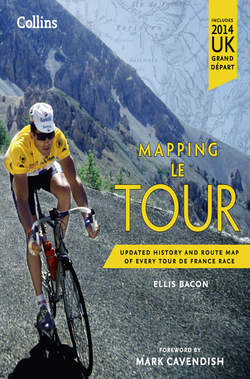Читать книгу Mapping Le Tour: The unofficial history of all 100 Tour de France races - Ellis Bacon - Страница 16
Оглавление1908
6th Edition
“It’s time to hand over the mantle. Next year’s Tour is for Faber.”
1908 Tour champion Lucien Petit-Breton following his second consecutive overall victory, suggesting that Luxembourg’s François Faber, his Peugeot team-mate, is the rightful heir to the Tour crown
| Start: Paris, France, on 13 JulyFinish: Paris, France, on 9 August | |
| Total distance: 4488 km (2789 miles)Longest stage: 415 km (258 miles) | |
| Highest point:Col de Porte: 1326 m (4350 ft)Mountain stages: 4 | |
| Starters: 114Finishers: 36 | |
| Winning time: 36 pointsAverage speed: 28.740 kph (17.858 mph) | |
| 1. Lucien Petit-Breton (Fra) 36 points2. François Faber (Lux) 68 points3. Georges Passerieu (Fra) 75 points |
Lucien Petit-Breton arrived at the 1908 edition of the Tour in rude form, having already won that year’s Paris-Brussels – a one-day race still in existence, now held in September, but then held in April.
The 1908 Tour followed the exact route of the previous edition, both starting on Paris’s Ile de la Jatte and finishing at the Parc des Princes. The only real change was the number of starters – up to 114 from 93 the year before – and Petit-Breton’s absolute dominance of the race this time, becoming the first rider to win two Tours (winner of the inaugural Tour, Maurice Garin, having been disqualified after cheating to win the 1904 edition).
Although London-born Georges Passerieu – second at the 1906 Tour to the late René Pottier – put up a good fight, winning stages 1, 5 and 13, and standing out as the only rider capable of getting over the Col de Porte and ‘Pottier’s mountain’, the Ballon d’Alsace, without walking, his Peugeot-Wolber ‘team-mates’ (riders often simply shared the same sponsors rather than necessarily working as a team), Petit-Breton and François Faber, dominated the race with five and four stage victories apiece, respectively.
René Pottier’s younger brother, André, helped to keep the family name alive by leading the race over the Col Bayard and Côte de Laffrey, but simply wasn’t in the same league as his more famous sibling, and could only finish seventeenth overall in Paris.
François Faber struggles over the summit of the Ballon d’Alsace
